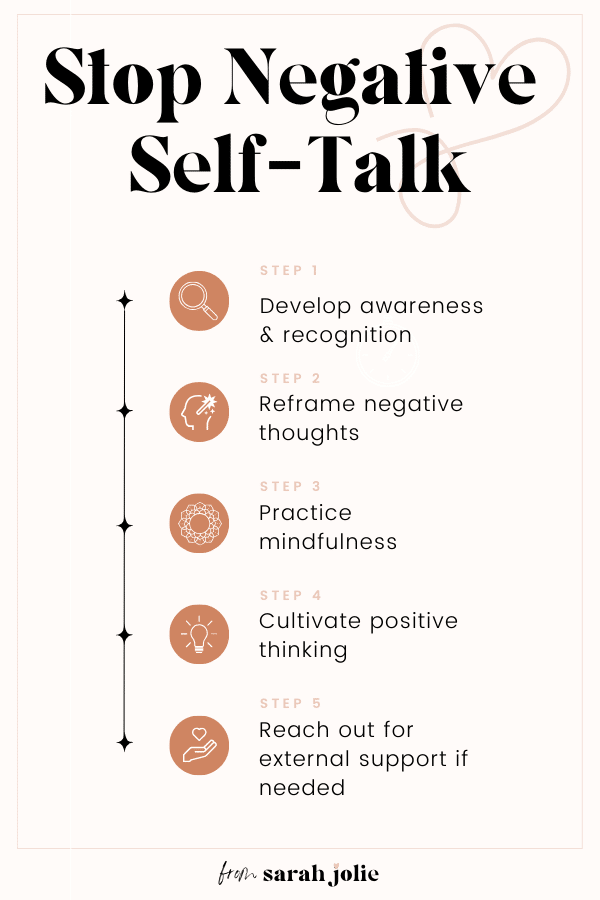5-Step Guide to Stop Negative Self-Talk
Want to stop being so critical of yourself? This article has everything you need to know about negative self-talk, its impacts, and how to conquer it.

We’ve all had that little voice inside our heads, pointing out our mistakes, downplaying our achievements, and highlighting the worst-case scenario. This inner dialogue, known as “negative self-talk,” is something I’m VERY familiar with.
For a long time, I thought it was natural to be our own worst critics! Picking on yourself only makes you better and want to improve, right? WRONG. Very wrong. The constant negative chatter in my mind became my reality. Beating myself up over every mistake made me think that I did suck at doing things. The critical voice in my head heightened my fear of failure and soon started to paralyze me from even taking action toward my goals.
Those are only some of the damaging effects that negative self-talk can have on you. If left unchecked, it can have quite devastating effects on all aspects of your well-being. However, the good news is that there are many strategies you can employ to stop this form of thinking and transform it into something more positive!
This post is all about negative self-talk and how to stop it.
WHAT IS NEGATIVE SELF-TALK?
Negative self-talk is any critical, pessimistic, or demeaning thoughts you have. It’s any time you criticize yourself and negatively interpret situations in a way that makes you feel bad about yourself or your capabilities.
There are SO many ways you might experience negative self-talk. Some examples are:
1. Overgeneralizing: believing because something happened once, it will always happen
“I got rejected by this job, so I’m never going to be able to get a job”
2. Catastrophizing: anticipating the worst possible outcome
“I didn’t finish this assignment, so I’m going to fail the class and never graduate”
3. Negative filtering: focusing only on the negative and ignoring the positive
“Although everyone gave me praise for my presentation, I spoke too quickly”
4. Using “should” statements to judge: holding yourself to unrealistic standards
“I should have done better on that test”
5. Identifying with failures/mistakes: seeing every failure as a part of your identity
“I didn’t do well on this project so I’m a failure”
These negative thought patterns often come from our core beliefs and have deep roots. They can stem from so many things! It can be from past experiences that didn’t go well, traumas, feedback from others, and societal norms. By continuing to focus on them, it can be easy to amplify feelings of inadequacy and ultimately drown in a sea of negativity.
THE TOXIC IMPACTS OF NEGATIVE SELF-TALK
Negative self-talk doesn’t just make us feel bad – it can have quite damaging consequences for various aspects of our lives. Here are some ways negative self-talk affects our wellness:
Mental Health
Erodes your self-esteem
Our self-worth and self-esteem can often be the first casualties of constant negative self-talk. By downplaying your achievements and magnifying your mistakes, you create a distorted self-image over time. This leads to decreased confidence to tackle challenges, which contributes to a growing low self-esteem.
Intensifies mental health disorders
Prolonged periods of negative inner dialogue can exacerbate feelings of depression and anxiety. Constantly ruminating negative emotions and telling yourself you’re not good enough pushes the mind to believe these narratives. Criticizing yourself is the last thing you need when going through mental struggles.
Physical Health
Increases stress
Consistent negative self-talk keeps your body in a heightened state of stress. Chronic stress impacts all parts of your body and it’s processes. It causes physiological responses such as increased heart rate, elevated cortisol (stress hormone) levels, and high blood pressure. This puts you at an increased risk for many physical health issues like muscle pain, respiratory issues, heart attacks, or strokes.
Decreases sleep quality, affecting the immune system
The tossing and turning at night due to overthinking can lead to sleep disturbances. Poor sleep weakens the immune system and makes you more susceptible to infections. Sleep is also when your body has the ability to heal and repair itself and lower sleep quality increases the risk of chronic conditions.
Personal Growth & Relationships
Stunts personal growth
Because negative self-talk causes you to doubt your abilities and avoid challenges, your motivation to learn, evolve, and grow will decrease. Over time, this can lead to not pursuing goals and not fulfilling your potential.
Increases procrastination and avoidant tendencies
Constantly telling yourself you’re not good enough or always predicting failure can make you more likely to put off tasks. Procrastination is a coping mechanism to avoid failure which then leads to missed opportunities.
Strains relationships
Negative self-talk can make you hypersensitive to criticism and prone to projecting your insecurities onto others. Doing so can easily strain relationships, as your friends and family may feel they have to walk on eggshells around you.
In essence, while negative self-talk might just seem like an internal voice, its ramifications can be found in every aspect of your life! It affects your cognitive performance and physical health. When you internalize this negative thinking, it becomes a self-fulfilling prophecy and starts cementing these beliefs into your identity.
HOW TO STOP NEGATIVE SELF-TALK
Soothing your inner critic is a journey. Chances are, negative self-talk has been a habit you’ve carried for a while – i’s a formidable adversary that often lurks in the subconscious mind! However, with some effort, you can train yourself to nurture a more positive and empowering internal dialogue. Here’s how:
1. Develop awareness and recognition
The first step to stopping negative self-talk is to start paying attention to your internal dialogue! By doing so, you can identify patterns and recognize when these thoughts come into your head. Two things you can do to help with this are:
Journal and self-reflect:
Designate a place in your notebook or phone to jot down negative thoughts as they come. Over time, you’ll find patterns, triggers, or recurrent themes in your self-talk. Journaling provides a tangible record, allowing you to confront these negative narratives head-on.
Get feedback from your friends/family:
2. Use cognitive behavioral strategies to reframe negative self-talk
Once you’ve learned how to identify negative self-talk, the next step is to learn how to transform your negative beliefs. This will be a conscious effort you need to take over time, but is well worth it! Here’s how:
Challenge negative thoughts:
Next time you have a negative thought, don’t passively accept it. Ask yourself these things:
- Is this really true?
- Have there been times in the past that I’ve proven to myself this is false?
- Would I say this about someone else in my situation?
Reframe failures as lessons:
Failing and making mistakes is a fact of life. We all experience them. Seeing mistakes as a way for you to learn and adapt is the best way to move forward! Failures don’t define you.
Replace exaggerated claims:
Negative self-talk often involves exaggerating and absolutes. Instead of thinking “I can never do anything right,” think “I made a mistake this time, but I’ve done many things correctly before!”
3. Practice mindfulness
Mindfulness is the practice of focusing on the present and observing without judgment. Incorporating mindfulness into your daily routine is a great way to help reduce rumination and worry. Instead of being upset with yourself for having a negative thought, acknowledge its presence and recognize that simply having that thought doesn’t define you.
In addition, whenever you feel overwhelmed by negative self-talk, try a grounding technique like the “5-4-3-2-1” method. This technique involves finding five things you can see, four you can touch, three you can hear, two you can smell, and one you can taste. By using this method, you can anchor to the present and focus less on intrusive thoughts.
A Post You Might Like: 49+ Mindfulness Journal Prompts to Elevate Your Life
4. Cultivate positive thinking
Stopping negative thinking is one part of the process. The other part is to develop a habit of focusing on positive thoughts. Two ways you can start to learn positivity are:
Practice positive affirmations:
Affirmations are statements like “I am capable” and “I am deserving of love and respect.” Start a habit of saying these to yourself every day or writing them down. By focusing on the good things, you’ll have less space for the bad!
Visualize yourself as successful:
Visualization is a powerful technique that can help our brains see what’s possible. By simply imagining yourself achieving your goals, you can start to rebuild your confidence!
A Post You Might Like: How to Speak Things into Existence
5. Reach out for external support if needed
We all need help sometimes! Negative self-talk is a huge beast to conquer, so don’t be shy about reaching out to additional resources. You can find great therapists and counselors who are trained in techniques like Cognitive Behavioral Therapy (CBT). They can offer you personalized strategies to tackle your unique patterns of negative self-talk.
In addition, you can also reach out to a mental health support group (find NAMI Programs here)! Listening to others’ experiences and sharing your own can be extremely healing because it provides you with a sense of solidarity. Knowing you’re not alone and your experiences are valid can be super comforting. It might just be the help you need to get through this.
While the journey from negative to positive self-talk can be challenging, equipped with the right tools and strategies, you can rewrite your inner narrative to be more empowering!
BENEFITS OF POSITIVE SELF-TALK
When you start to let go of negative self-talk, it’s key that you trade it for positivity! Thinking more positively about yourself will have so many fantastic impacts on your well-being. Here are all the ways transforming your negativity into positivity will change your life.
1. Enhanced mental and physical health
When you curb negative self-talk, you’ll have better emotional stability and be less prone to bouts of sadness and feelings of hopelessness. Thinking more positively will help reduce stress and all the negative things that come with it: a higher risk for illnesses as well as a lower immune system. There’s also growing evidence that happier and more optimistic people are less prone to heart disease!
2. Improved interpersonal relationships
Cultivating positive thinking can help you foster better and deeper relationships. When you value yourself, you can articulate your needs, desires, and boundaries more effectively. You allow yourself to be more vulnerable with others and create stronger connections. Your stronger self-esteem will be more receptive to feedback, therefore reducing conflict in your life!
3. Greater achievement and fulfillment of your goals
Positive self-talk will help you build your confidence. You’ll be more likely to take action, set goals, and achieve them. Much like negative self talk is a self-fulfilling prophecy, so is positive self-talk. The more you think you can do, the more action you take, and the more you succeed. This is a cycle of fulfillment and success!
4. Enhanced resilience
When you shift your mindset towards positive thinking, you’ll reinforce resilience. When faced with adversity, instead of resorting to self-blame or feeling defeated, you’ll be more inclined to see it as a temporary setback. Viewing challenges as opportunities fosters more creative problem-solving and will help you reach your goals with less of a mental struggle.
Reducing negative self-talk isn’t just about feeling momentarily better. Its benefits permeate various spheres of our lives, leading to holistic well-being and growth.
In a world filled with constant challenges, the least you can do is be your own best friend. It’s time to let go of that negative voice in your head and start fueling positive self-talk! Turning down the negative inner voice is key to unlocking new, positive changes in your life.
This post was all about negative self-talk, its damaging impacts, and how to stop it.



1 comment
Comments are closed.